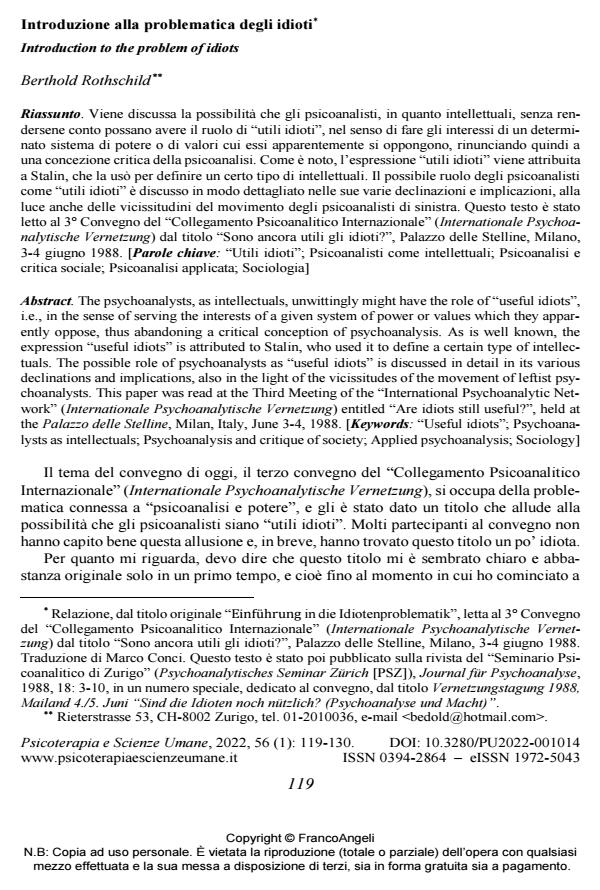Introduction to the problem of idiots
Journal title PSICOTERAPIA E SCIENZE UMANE
Author/s Berthold Rothschild
Publishing Year 2022 Issue 2022/1 Language Italian
Pages 12 P. 119-130 File size 400 KB
DOI 10.3280/PU2022-001014
DOI is like a bar code for intellectual property: to have more infomation
click here
Below, you can see the article first page
If you want to buy this article in PDF format, you can do it, following the instructions to buy download credits

FrancoAngeli is member of Publishers International Linking Association, Inc (PILA), a not-for-profit association which run the CrossRef service enabling links to and from online scholarly content.
The psychoanalysts, as intellectuals, unwittingly might have the role of "useful idiots", i.e., in the sense of serving the interests of a given system of power or values which they apparently oppose, thus abandoning a critical conception of psychoanalysis. As is well known, the expression "use-ful idiots" is attributed to Stalin, who used it to define a certain type of intellectuals. The possible role of psychoanalysts as "useful idiots" is discussed in detail in its various declinations and im-plications, also in the light of the vicissitudes of the movement of leftist psychoanalysts. This pa-per was read at the Third Meeting of the "International Psychoanalytic Network" (Internationale Psychoanalytische Vernetzung) entitled "Are idiots still useful?", held at the Palazzo delle Stel-line, Milan, Italy, June 3-4, 1988.
Keywords: "Useful idiots"; Psychoanalysts as intellectuals; Psychoanalysis and critique of society; Applied psychoanalysis; Sociology
- AA.VV. (1987). Sonderausgabe (Numero speciale): “10 Jahre Dissidenz”. Journal für Psychoanalyse (Psychoanalytisches Seminar Zürich [PSZ]), dicembre 1987 [Atti del convegno Dissidenztagung, Zurigo, 7 novembre 1987. Contributi di Peter Schneider, Thomas Kurtz, Regula Schiess, Fritz Meerwein, Mario Erdheim. Dibattito, moderato da Silvia Ramer, con interventi di Irene Brogle, Judith Valk, Emil Grütter, Emilio Modena, Pierre Passet, Elda Storck: pp. 74-86. Discussione plenaria: pp. 47-90].
- Adorno T.W. (1951). Minima Moralia. Reflexionen aus dem beschädigten Leben. Berlin: Suhrkamp (trad. it.: Minima moralia. Torino: Einaudi, 1954).
- Altvater E., Ganßmann H., Heinrich M., Hübner K. & Mahnkopf B. (1988). Editorial: Intellektuelle Kritik in der gesellschaftlichen Krise. Prokla, 18, 70: 2-18 -- (www.prokla.de/index.php/PROKLA/article/view/1300/1236).
- Bàrberi Squarotti G., a cura di (1972). Grande dizionario della lingua italiana, Vol. VIII. Torino: UTET, 1961-2002 (21 volumi).
- Binswanger R. (1984). Engineering of consent. Widerspruch: Beiträge zur sozialistischen Politik, 4, 8: 49-60.
- Bolko M. & Rothschild B. (2006). Una “pulce nell’orecchio”. Cronaca del controcongresso dell’International Psychoanalytic Association di Roma del 1969. Psicoterapia e Scienze Umane, XL, 3: 703-718 (ristampa: Psicoterapia e Scienze Umane, 2015, XLIX, 3: 431-446.
- Chomsky N. (1978). Intellectuals and the State. In: Towards a New Cold War: Essays on the Current Crisis and How We Got There. New York: Pantheon, 1982, pp. 60-85.
- Fraenkel E. & Bracher K.D., editors (1957). Intelligenz. In: Das Fischer Lexikon: Staat und Politik. Frankfurt a.M.: Fischer, 1957.
- Freud S. (1905). Il motto di spirito e la sua relazione con l’inconscio. Opere, 5: 3-211. Torino: Boringhieri, 1972.
- Galli P.F., Codignola E. & Rothschild B. (1974). Intellektuelle und Klassenkampf am Beispiel der Psychoanalyse. Arbeitspapiere zur Psychoanalyse (a cura del Psychoanalytisches Seminar Zürich [PSZ], Waserstrasse 43, CH-8053 Zurigo), 1: 2-13 (Pier Francesco Galli, Intellektuelle und Klassenbewusstsein am Beispiel der Psychoanalytiker), 14-26 (Berthold Rothschild, Zur Theorie des Unbehagens beim Intellektuellen), 27-35 (Enzo Codignola, Die Rolle des Psychoanalytikers als Faktor des psychoanalytischen Settings), 36-60 (Discussione).
- Habermas J. (1987). Heinrich Heine und die Rolle der Intellektuellen in Deutschland. In: Eine Art Schadenabwicklung. Frankfurt a.M.: Suhrkamp, 1987, pp. 25-54.
- Jacobi R. (1981). Dialectic of Defeat: Contours of Western Marxism. Cambridge, MA: Cambridge University Press.
- Konrad G. & Szelényi I. (1978). Die Intelligenz auf dem Weg zum Klassenkampf. Frankfurt a.M.: Suhrkamp (trad. inglese: The Intellectuals on the Road to Class Power: A Sociological Study of the Role of the Intelligentsia in Socialism. New York: Harcourt Brace Jovanovich, 1979).
- Macciocchi M.A. (1974). Per Gramsci. Bologna: Il Mulino.
- Marquard O. (1987). “Verspätete Moralistik”. Bemerkungen zur Unvermeidlichkeit der Geisteswissenschaften. Kursbuch, 1988, 91: 13-22.
- Migone P. (1989). I venti anni di Plataforma Internacional (Relazione tenuta alla XX Anniversary Convention del movimento Plataforma Internacional [Platform International], Ristorante Il Bagatto, Roma, 10-12 novembre 1989). Il Ruolo Terapeutico, 1990, 53: 41-43. Edizione su Internet: www.psychomedia.it/pm/modther/probpsiter/ruoloter/rt53plat.htm.
- Passett P. (1987). Das obligat widersprüchliche Verhältnis des psychoanalytischen Denkens zum Zeitgeist. Ein Plädoyer für die wiederzugewinnende Souveränität psychoanalytischen Denkens. In: Einspruch, aprile 1988. Anche in: Psyche, 1991, 45, 3: 193-227.
- Proust M. (1927). Le temps retrouvé. In: A la recherche du temps perdu. Paris: Gallimard, 1913-27, vol. VII (trad. it.: Il tempo ritrovato. In: Alla ricerca del tempo perduto. Torino: Einaudi, 1963-65, vol. 7).
- Rothschild B. (1986). “Unerwartete Komplikationen bei der Konkretisierung von Utopien”, Tagungsreferat “Psychoanalyse und Revolution”. In: Werkstatt für Gesellschafts- und Psychoanalyse Salzburg & Psychoanalytisches Seminar Zürich, editors, Salud Mental in Nicaragua: Psychoanalyse im Dienste des Volkes. Freiburg i.Br.: Kore, 1988, pp. 157-169.
- Sartre J.P. (1971). Ein Betriedstribunal (Intervista di Claude Kiejman). In: Der Intellektuelle und die Revolution. Berlin: Luchterhand, 1971.
- Szelényi I. (1988). Möglichkeiten und Grenzen des Projekts einer neuen Klasse in Osteuropa Selbstkritische Überlegungen zu “Die Intelligenz auf dem Weg zur Klassenmacht”. Prokla, 18, 70: 94-124 -- (www.prokla.de/index.php/PROKLA/article/view/1305/1241).
Berthold Rothschild, Introduzione alla problematica degli idioti in "PSICOTERAPIA E SCIENZE UMANE" 1/2022, pp 119-130, DOI: 10.3280/PU2022-001014